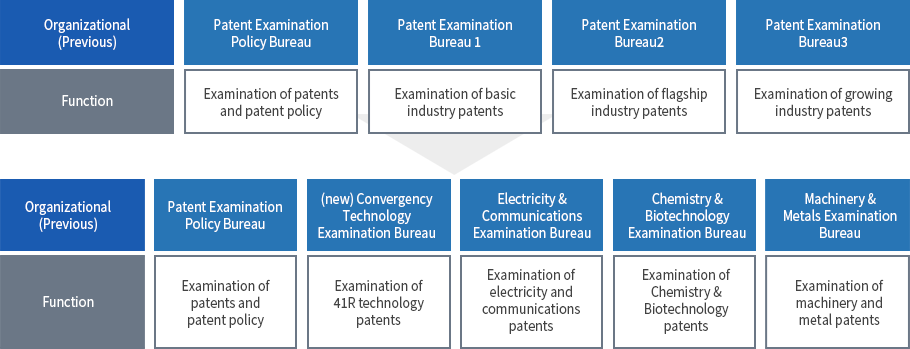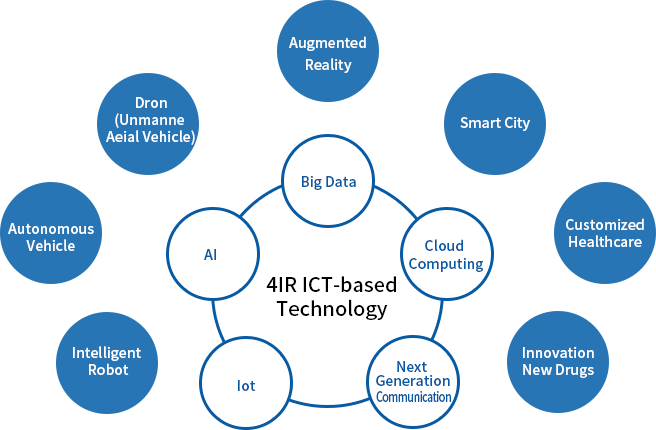Examination Fourth Industrial Revolution Technologies
Digital Convergence Examination Bureau
In order to adapt to developments in the IP environment and provide sufficient IP services, KIPO implemented appropriate measures to improve its patent examination. An organizational restructuring was initiated within KIPO in 2019 which led to the establishment of a new "Digital Convergence Examination Bureau" dedicated to the examination of technologies related to the Fourth Industrial Revolution (4IR), such as artificial intelligence (AI), big data, and bio-health.
Before the reorganization, MOIP's patent examination was carried out by four bureaus: the Patent Examination Policy Bureau and Patent Examination Bureau 1, 2, and 3. A more efficient system was established according to technology fields and the relocation of examiners with specific expertise. As of 2019, there are five bureaus managing patent examinations: the Patent Examination Policy Bureau; the Digital Convergence Examination Bureau; the Electricity & Telecommunications Examination Bureau; the Chemical & Biotechnology Examination Bureau; and the Machinery & Metals Examination Bureau.
Considering the specificity of 4IR-related technologies, the Digital Convergence Examination Bureau consists of six divisions and teams related to the 4IR: The Artificial Intelligence and Big Data Examination Division; the Internet of Things Examination Division; the Biotechnology & Healthcare Examination Division; the Intelligent Robot Examination Division; the Smart Manufacturing Examination Division; and the Autonomous Driving Technology Examination Team. Furthermore, new examination criteria were established through consultation between the Bureau and industries which will play a pivotal role to promote the development and growth of 4IR-related technologies and industries.
Organizational Restructure of Patent Examination

Consensus-based Consultative Examination Among Examiners
Patent examination is generally carried out by one examiner for each invention and processed under one main examiner even with consultation from other examiners. In 2019, KIPO began implementation of examinations based on the consultation and consensus of a group of examiners specializing in 4IR technologies. Under the new system, three examiners from the Convergence Technology Examination Bureau consult together from the onset of the examination and come to a consensus, similar to that of the Intellectual Property Trial Tribunal.
Due to many 4IR-related inventions often incorporating two or more different technical fields, a group of examiners makes it possible to provide relatively higher-quality examination services and increase examination consistency by sharing opinions on patentability requirements and reducing discrepancies.
New Patent Classification Applications Related to Emerging Technologies of the 4IR
Accelerated examination allows a way to preferentially review necessary applications while responding to continual changes in industrial structure and advancement of the technological environment. Since being first adopted in 1981 and gradual expansion, applications filed in various kinds of high-tech industries have been made eligible for the accelerated examination program.
Fitting into emerging technologies, a new patent classification system was established for seven technological fields1) in 2018, and nine technology fields2) were newly added in 2019 which can benefit from the program. Currently, eligible patent applications filed under the accelerated examination are registered in an average of 5.5 months, up to 10 months earlier than general examinations.
Technology of the 4th Industrial Revolution
- Convergence Service Fields

-
 Industry-based Technology
Industry-based Technology
- 1) Artificial Intelligence, Internet of Things, 3D printing, autonomous vehicle, big data, cloud computing, intelligent robot
- 2) Innovative new drug, customized healthcare, smart city, AR/VR, renewable energy, drone, new generation communication, intelligent semiconductor and advanced material
- Last updated 11 April 2023
Trade and Cooperation Division